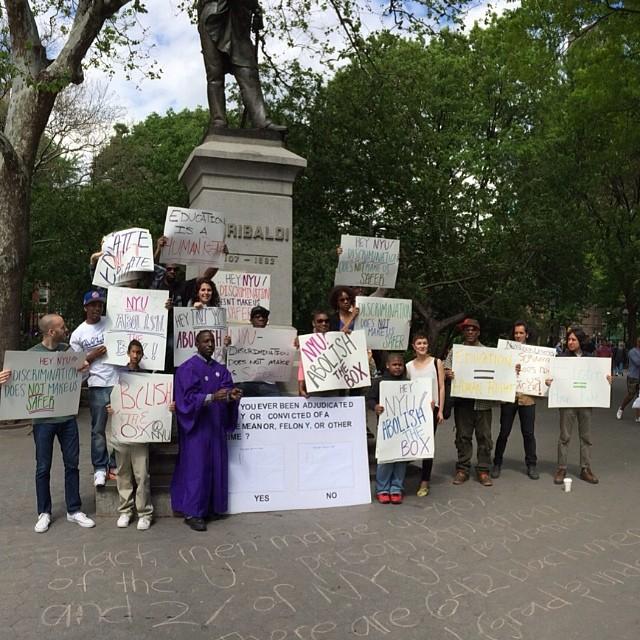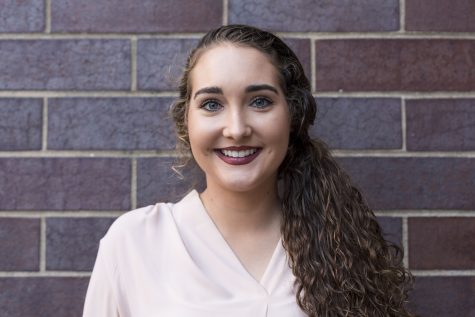Talking With the People Behind the Ban the Box Movement
The Incarceration to Education Coalition has urged NYU to remove the criminal conviction box from their undergraduate application.
February 8, 2016
In the last two weeks, NYU has made significant strides in a national movement to remove questions of previous disciplinary action or criminal history — known as the box — from applications concerning employment or higher education. On Jan. 27, WSN reported the Silver School of Social work had removed the box from its Master’s program application, and on Feb. 1., NYU sent a letter to the Common Application organization calling for more research on the box’s possible effects on applicants and campus safety.
WSN sat down with Incarceration to Education Coalition, a student group which has advocated for the box’s removal, to discuss their efforts to abolish the box in NYU’s undergraduate application. The organizers interviewed were Gallatin alumnus Eric Sturm, CAS alumnus Emma Pliskin and Gallatin junior Sumathy Kumar. The interview was edited for clarity and length.
How has NYU responded for calls for removing the box in the past?
SK: We organized the sit-in [at the Welcome Center] to try to get NYU to write the letter to the Common App, demanding that they condemn the box as racist, with a threat to boycott if the Common App doesn’t agree.
ES: Around 5 p.m. when the building was closing we said we [IEC] will leave if we are guaranteed a meeting with you to discuss this letter to the Common App. At the meeting the idea the administration presented was “We are not going to say that we reject the box; we don’t believe there is enough evidence to say that.”
ES: There’s been basically a consensus for the last, I’d say 40 years, of studying incarceration and recidivism rates. Probably the biggest thing you can do to reduce recidivism and improve people’s lives who have been incarcerated is giving them an education.
SK: You can’t advertise yourself as in and of the city when you refuse to open your doors to many people that are in the city. If the city is mostly black and brown, and black and brown people are the most targeted by mass incarceration, they’re the ones who have to check the box. It’s complete hypocrisy.
Could you take us through the chronology of what’s happened within the last two semesters with IEC?
EP: We had a sit in at the Welcome Center in December, and won a meeting with high level administration. The meeting kind of ended in stalemate. We were staunchly sticking to our letter, and they were staunchly sticking to not our letter. The plan was for each of us to rewrite our letters and come back together. We added things to our letter but did not change the overall tone and intention of the letter. They added things to their letter but did not change the overall tone and intention of their letter. Following that meeting, we requested that they not send out their letter to the Common App. They said they would send it out anyway.
EP: One of our major concerns was the notion of urgency. For every application cycle, for every year, there are slews of people who are unable to access education and whose quality of life continually diminished at the hands of this kind of racist thought. One thing that they did incorporate into their letter upon hearing that concern was a notion of urgency. They want preliminary data by the next admissions cycle.
You didn’t want NYU to publish their version of the letter? Wouldn’t any letter be better than no letter at all?
EP: We stated in the meeting, no, please don’t send out this letter, because it is a stalling tactic.
ES: The question we’re asking them is “Will you publically condemn this?” and basically the answer to that is no because they want more research. And if the headline was “NYU refuses to condemn the box,” that’s a very different headline than “NYU says let’s do more research.”
So what does NYU need to do from here, what’s the logical next step?
EP: So, in the letter they asked for a meeting with the Common App. That meeting could be pivotal depending on NYU’s tone in the meeting, NYU’s inclusion of IEC in the meeting and in the work as it progresses, is fundamental. The urgency with which they do this: so if the Common App says no, NYU could boycott or NYU could get angry. And I doubt they will.
What do you think it’ll take to get NYU or the Common App to budge on their stance?
ES: One thing that we are doing that is part of it is developing a national campaign to make this happen. Some IEC members are involved in a national Abolish the Box campaign. I think what NYU has to know is that basically the whole country is looking to them as the model and if they want to say that we are a school that is committed to inclusion, racial justice, all these things that we say that we are committed to, we have to be the leaders here.
Here is the letter that the IEC proposed sending to the Common Application:
Here is the letter that NYU ended up sending to the Common Application:
NYU-Proposed-Letter-to-the-Common-App-1-v-Final (Text)
A version of this article appeared in the Monday, Feb. 8 print edition. Email Anne and Lexi at [email protected].











































































































































